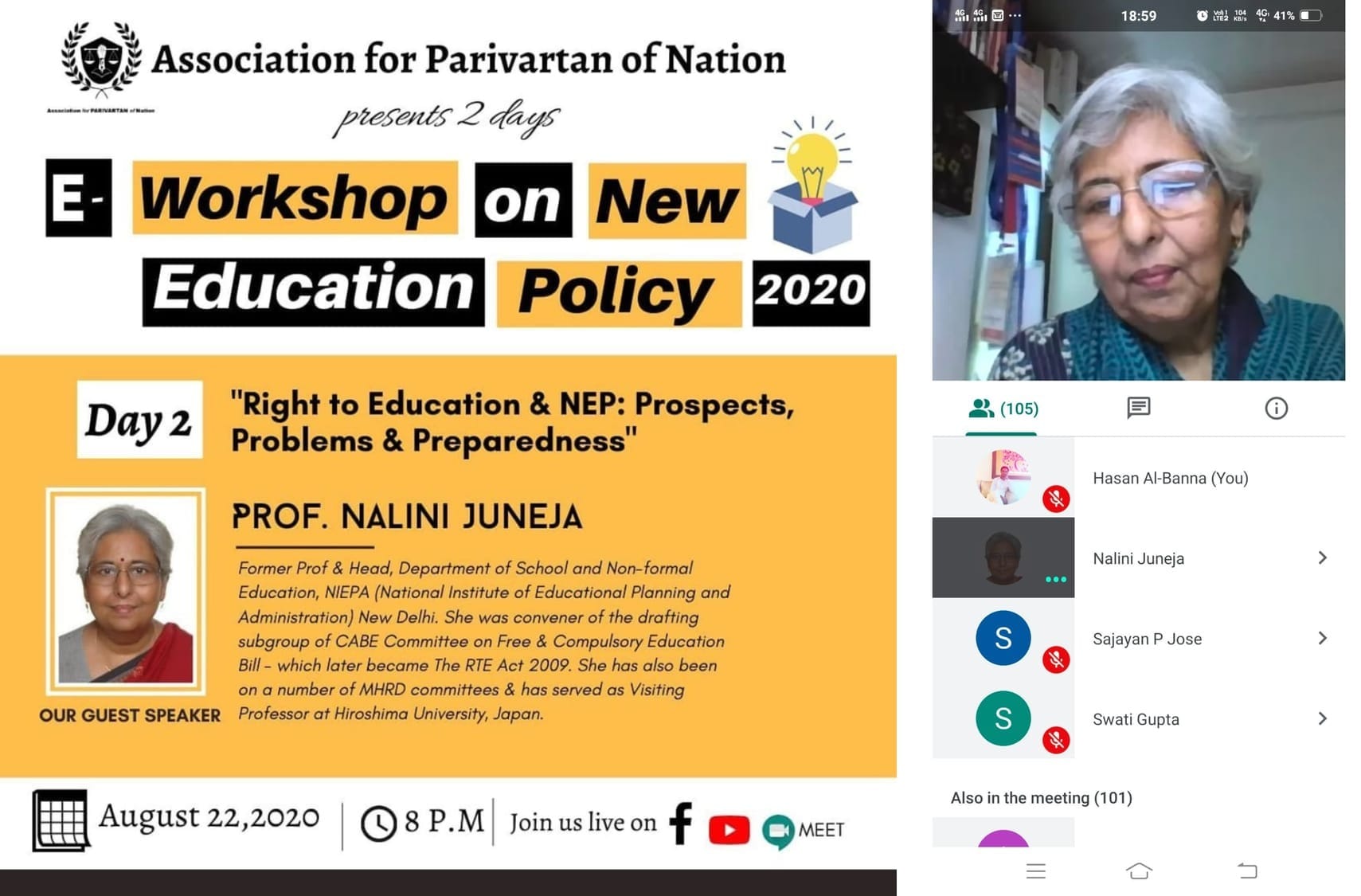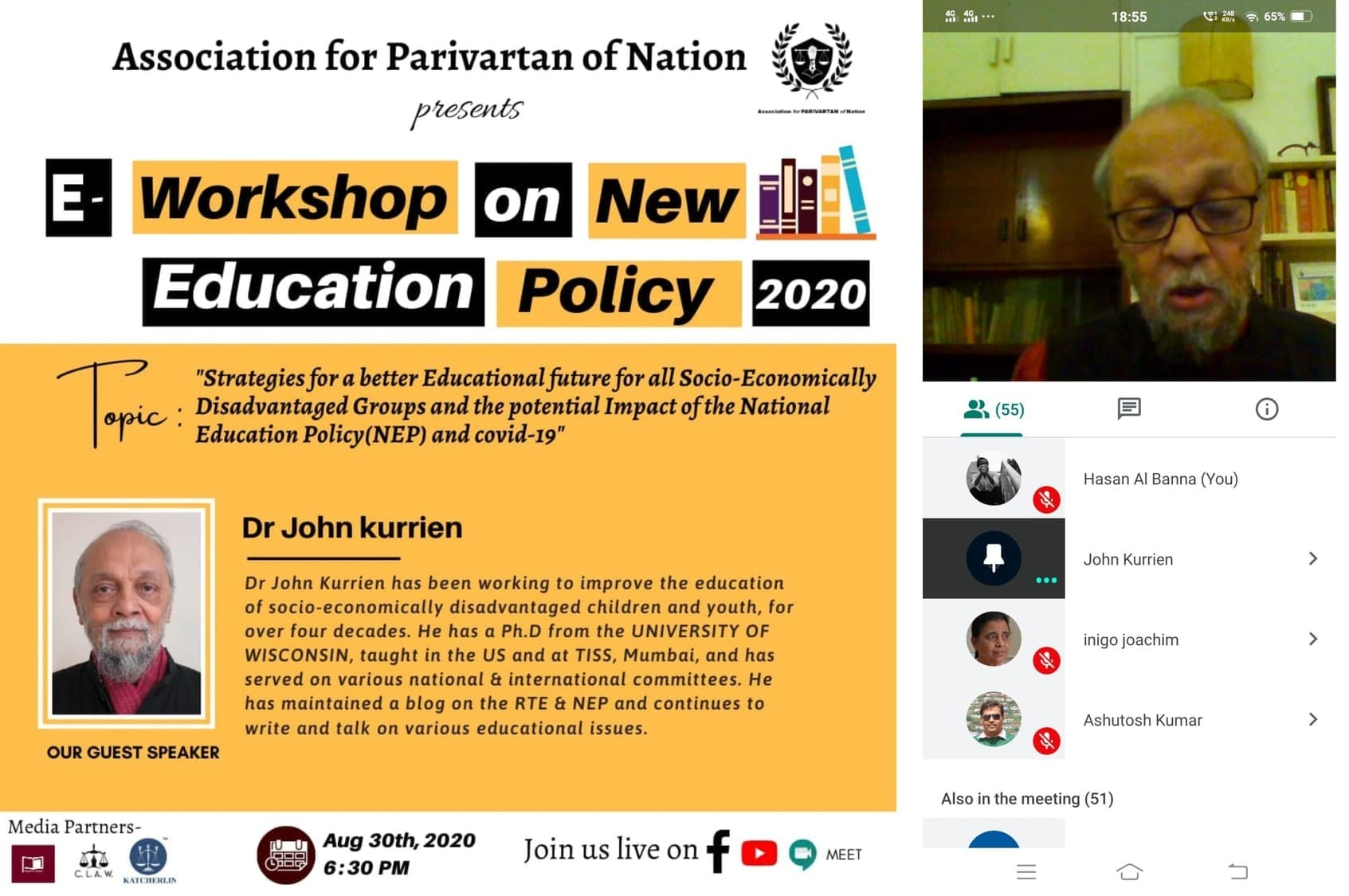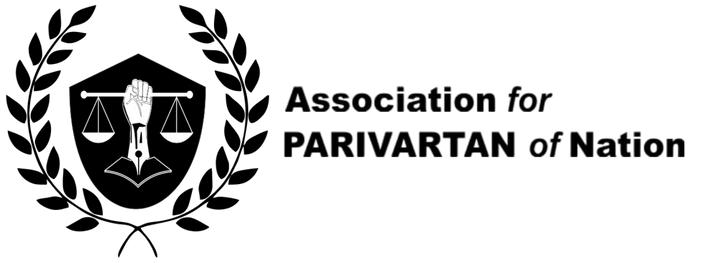E-Workshop: New Education Policy 2020
From 21st–23rd August 2020, APNA organised a three-day E-Workshop on NEP 2020, engaging over 2,000 participants through multiple online platforms.

Education, Inequality and the Pandemic’s Shadow
Association for Parivartan of Nation organised a three-day E-Workshop on the New Education Policy (NEP) 2020 from 21st to 23rd August 2020, bringing together educators, parents, legal experts, and students to critically engage with the promises and challenges of the policy. Across the three days, we saw over 290 participants through multiple online platforms. The discussions not only dissected the technical aspects of the policy but also highlighted lived realities, aspirations, and the voices of those most affected by educational reforms.
Day 1: Analysing Opportunities and Challenges of NEP 2020

On the first day, 21st August 2020, the session was attended by over 100 participants on Zoom. The speaker, Advocate Ashok Agarwal, National President of the All India Parents Association and practising lawyer at the Supreme Court of India and Delhi High Court, offered a legal and parental perspective on the policy. Mr Agarwal underscored how the NEP 2020 would marginally increase the burden on State Governments, making adequate resource allocation an urgent issue. He strongly emphasised the role of parents as major stakeholders in education, remarking, “Education policies cannot be drafted in isolation. Parents are not bystanders, they are partners in shaping the future of their children.” He also commended the government’s effort to extend free education in government schools up to class 12, describing it as a “long-overdue but welcome step.” The interactive session closed with lively participation, where a parent from Chattisgarh shared, “For the first time, I felt that my concerns as a parent were being echoed at a national platform.”
Day 2: Right to Education, Problems and Preparedness

The second day, 22nd August 2020, was dedicated to examining the prospects, problems, and preparedness of institutions under NEP 2020. Due to an overwhelming response, the session was conducted in two batches via Google Meet, accommodating more than 200 participants in total. The speaker, Prof. Nalini Juneja, former Head of the Department of School and Non-Formal Education at NIEPA, brought deep academic insight to the discussion. She explained that while NEP 2020 holds the potential to transform Indian education, it also exposes the fragility of existing infrastructure.
“Policy documents often paint a picture of aspiration. But without adequate funding, capacity building, and teacher training, even the most ambitious policies remain on paper,” noted Prof Juneja.
Participants engaged with enthusiasm, and a teacher from Delhi reflected, “I worry that rural schools will be left behind. We need strategies that bridge divides, not widen them.” The conversation laid bare the urgency of ensuring equity in implementation.
Day 3: NEP, COVID-19 and Disadvantaged Groups

Moved by the intensity of dialogue in the first two days, we extended the workshop with a third session on 30th August 2020, attended by over 55 participants on Google Meet. This day focused on socio-economically disadvantaged groups (SEDGs) and the compounded challenges brought by COVID-19.
The speaker, Dr John Kurrien, a veteran educationist, drew on decades of experience to highlight the intersection of marginalisation, stigma, and access to education. He remarked,
“A policy is only as inclusive as the voices it centres. Unless the NEP makes space for the lived experiences of the poor, Dalits, tribals, and minorities, it will risk reinforcing inequalities instead of dismantling them.”
A participant from Bihar, the first in her family to pursue higher education, shared, “I worry if digital learning will leave girls like me behind. The Internet is a privilege, not a guarantee.” This heartfelt testimony underlined the urgency of bridging digital divides in both rural and urban settings.
Across the three days, the E-Workshop did not merely analyse the technicalities of NEP 2020 but created a collective space of questioning and imagination. Over 290 participants engaged in meaningful dialogue, with speakers weaving together legal, academic, and lived perspectives. As our organiser, Sneha noted, “This workshop has shown us that education is not just about policies, it is about people, struggles, and dreams. Our role is to ensure that these voices, especially those on the margins, are not just heard but placed at the centre of reform.” The sessions ended with a shared commitment: to continue these conversations, push for inclusive implementation of NEP 2020, and ensure that education remains a tool of empowerment rather than exclusion.
